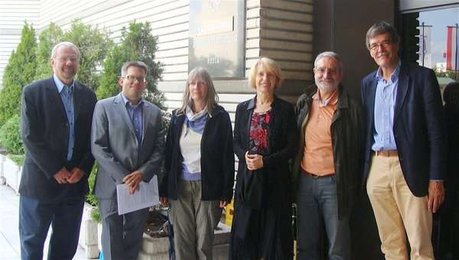Who decides which innovative idea will be awarded 25 Thousand Euros?
Do you have a spirit of invention? Do you have fresh, innovative ideas how to improve meteorological services? If yes, you should apply for the Harry Otten Prize! The call for applications is open until 10 March 2017. We expect a tough competition between many excellent innovative ideas, and we thought you might be interested in who will decide the winner. There is a formal selection procedure in place that will be strictly observed in order to ensure maximum transparency and traceability of the selection process.
A selection committee is composed of Otten Foundation’s board members, all who all have an excellent reputation in meteorology. The selection process is steered by the chairman of the Foundation, Richard Anthes, who is currently President Emeritus of the University Cooperation for Atmospheric Research in Boulder, Colorado. During his long scientific career, he has held a number of scientific leadership positions. His career includes experience at NOAA, Penn State University and NCAR (National Center for Atmospheric Research). He has won several prestigious awards, including the AMS Jule Charney Award and the Chinese Friendship Award, the highest award China makes to foreigners. Rick has also been awarded Honorary Membership of the AMS. His experience has provided him with wisdom and knowledge necessary to chair the selection committee.
Of course, he is not alone in this endeavour; other experienced board members assist him. First to mention is the vice chairman of the foundation, Dennis Schulze, who has a leadership position in the private sector at MeteoGroup as Chief Operating Officer. MeteoGroup is a highly successful meteorological services company founded by Harry Otten in 1986. Dennis is also responsible for research and development at MeteoGroup. The private sector is constantly constrained to compete and improve the services; on the free market only innovation and excellence of services ensures a sustainable future. Dennis brings his experience in this valuable culture to our Board.
Another well-known member of the Board and selection committee is Dominique Marbouty. Although during his long professional career he has held several important positions. Most meteorologists know him as former Director-General of the European Centre for Medium-Range Weather Forecasts (ECMWF) and deputy director general of Météo-France, the French national weather service. He is currently active in the audit body of the French ministry of Environment and was a recent President of the European Meteorological Society.
In 2014 Leo Kroon from the Netherlands joined the board and thus also the selection committee. Leo is Lecturer in Meteorology at Wageningen University. He has been active in the Dutch Meteorological Society and was Chief Editor of their journal Meteorologica. Besides scientific knowledge he is adding to the board a valuable perspective from the education sphere.
The communication aspects of proposals are taken care of by Tanja Cegnar, char of the EMS Media and communication team n member of the WMO CCI management group responsible for capacity building. Tanja works at the Slovenian Environment Agency and is a weather broadcaster at the national television in Slovenia. She was recently awarded the first EMS Outstanding Contribution Award at the EMS annual meeting in 2015 in Sofia, Bulgaria. She was honored “for her relentless pursuit of the Media and Communication activities of he Society”.
The final member of the selection committee is David Burridge, former Director-General of the ECMWF and the newest member of the Harry Otten Foundation Board. David will officially join the Board on 1 January 2017. Please see the previous News article for more information on David’s background and achievements.
Thus, the diverse selection committee from six different countries is fully qualified to make informed decisions through the decision process and to finally select the best innovative idea which will be awarded the 25 thousand Euro prize.
After submission of all applications by 10 March 2017, each member will carefully evaluate all the proposals individually. The main selection criteria are compliance with solid science and innovation, taking into account that proposals already on the way to implementation are not eligible. Also, proposals that are already being implemented will not qualify for the second round. After collection of all the individual votes, a teleconference will be organized and each member will present and justify his or her votes for each proposal. If a doubt or a major difference of opinion arises during the discussion, the selection committee will try to understand why and elaborate on that issue until the members will reach the consensus about the proposals, because only up to 8 proposals will qualify for the second round.
Those who qualify for the second round will be asked to develop further their proposal and answer a list of questions from the selection committee. Based on the extended proposals submitted by 29 may 2017, a second round of evaluation will take place. Again, each member of the selection committee will carefully evaluate the new information and will prepare a list of scores, which will be discussed during a second teleconference. The selection committee will have a challenging task to select 3 finalists with the best potential to meet the Prize criteria for the winner. The three finalists will be invited to publicly present their proposals during the EMS conference, in September 2017 in Dublin, Ireland, at the European Meteorological Society conference. They will answer additional questions from the selection committee members and from the audience. Based upon the overall proposal and presentations, the selection committee will make a final decision about the winner.
Now you know more about the jury and the selection process, you only need to apply for the award. We are looking forward to receiving your submissions!

Members of the Harry Otten Foundation at the EMS meeting in Sofia, September 2015. From left to right: Rick Anthes, Dennis Schulze, Andrea Oestreich (Executive Secretary), Tanja Cegnar, Dominique Marbouty and Leo Kroon.
